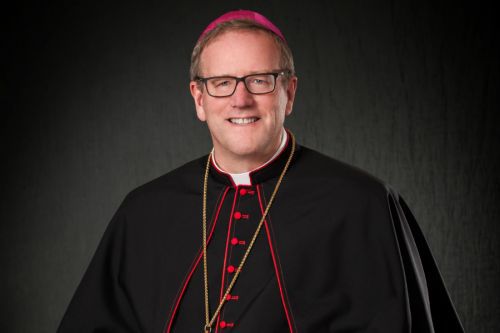Bishop Robert Barron has weighed in amid a media controversy after the Synod on the Family, saying some academic critics of New York Times columnist Ross Douthat are avoiding a good argument in countering his commentary on the synod, some bishops, and Pope Francis. “Are all of Ross Douthat’s opinions on the Synod debatable? Of course,” the bishop continued. “Do I subscribe to everything he has said in this regard? No. But is he playing outside the rules of legitimate public discourse in such an egregious way that he ought to be censored? Absolutely not!” Bishop Barron is an auxiliary bishop of the Archdiocese of Los Angeles, and former rector of Mundelein Seminary. His comments, published Oct. 29 on his Word of Fire website, are among the latest in an ongoing controversy about the Synod of Bishops’ discussions on the role of the family in evangelization. Douthat, a Catholic layman and author of the book Bad Religion: How we became a nation of heretics, engaged with the University of St. Thomas theology professor and news commentator Massimo Faggioli in an Oct. 23 Twitter exchange about heresy. Faggioli had said that when he hears bishops and theologians at the synod called heretics, “I reach for my Denzinger,” referring to Henry Denzinger’s famous compilation of Catholic teaching “The Sources of Catholic Dogma.” Douthat responded to Faggioli that is not fundamentalism to say that a proposal from Cardinal Walter Kasper regarding admission of some persons in states of life that are objectively gravely sinful “takes a view of marriage that the Church has consistently rejected.” Cardinal Kasper’s proposal would admit to sacramental Communion some Catholics who have divorced and remarried civilly. Many hold that it would break with Catholic teaching about the absolute indissolubility of sacramental marriage and the need to receive sacramental Communion while in a state of grace. Douthat wrote, “if you take a view the church has consistently rejected, you don't get to whine when the ‘h’ word comes up.” He added: “Own your heresy.” Faggioli said he did not know whether Cardinal Kasper’s proposal was “perfect,” but he put it in a context of development of doctrine similar to Church teaching on slavery, Jews, and papal infallibility. He then denigrated Douthat’s lack of a doctorate in theology. Faggioli claimed he won his first disputed theological question on Twitter, saying “what just happened to me as theologian on Twitter is very close to a debate between scientist and somebody saying the earth is flat.” He objected to heresy accusations against theologians who have devoted their life to the Church. Faggioli then joined with other Catholic academics in writing to the New York Times editors. Their 100-word letter, made public Oct. 26, said Douthat has “no professional qualifications” for writing on Catholicism. Its writers said the columnist analyzed Catholicism through “a politically partisan narrative that has very little to do with what Catholicism really is.” The letter said that accusing Catholics of heresy is “serious business that can have serious consequences for those so accused.” “This is not what we expect of The New York Times,” the letter concluded. The letter’s signers included Faggioli, Georgetown theology professor Father John O’Malley, S.J., Duquesne University School of Law professor Nicholas P. Cafardi, and Loyola University Chicago history professor Father Stephen Schloesser, S.J. The letter was published in the Jesuit weekly magazine America and on the blog Daily Theology. One of America’s editors, Catholic commentator Fr. James Martin, S.J., publicized the letter through his extensive social media. He agreed with the letter and said heresy is “a grave charge.” The letter has attracted other signers. For his part, Bishop Barron noted the letter’s closing sentence suggesting Douthat was performing below New York Times readers’ expectations. The bishop said this was “an unmistakable insinuation that views such as Douthat’s simply should not be allowed into the arena of public conversation.” Douthat, a longtime public defender of the Church, has taken a critical turn under Pope Francis. He contended in an Oct. 17 column that the Pope sides with the controversial proposal of Cardinal Kasper. He described the Pope as “the chief plotter” and argued that the Pope had used his power to make special appointment of synod delegates to empower the cardinal’s supporters. He also faulted the Vatican press office, which he claimed was filtering the synod in a way that biased press coverage towards Cardinal Kasper’s position. Bishop Barron in his commentary said Douthat is “careful in his expression” and an intelligent, committed Catholic. He encouraged Douthat’s critics to “make an argument against him; prove him wrong; marshal your evidence; have a debate with him; take him on.” Responding to the claim that Douthat sees the synod as excessively partisan, Bishop Barron said it can be reasonable to interpret Church history in a way focused on factions. “When has the life of the Church not been susceptible to a political reading?” he asked. The bishop also rejected the letter’s claim that Douthat is an unqualified commentator on religion due to his lack of a theological doctorate. He noted that many prominent Christian writers, such as Thomas Merton, Flannery O’Connor, Graham Greene, Evelyn Waugh, or more contemporary writers like Father Martin and George Weigel, have not had doctorates in theology. The bishop said there is a problematic tendency in American culture “to avoid real argument and to censor what makes us, for whatever reason, uncomfortable.”

